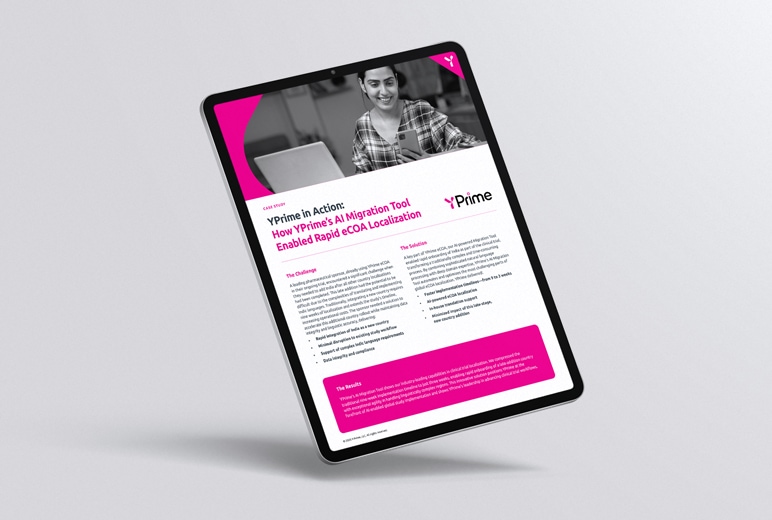On January 6, 2025, the FDA released a landmark draft guidance on the use of artificial intelligence (AI) and machine learning (ML) in drug development, providing a much-needed framework to advance credibility in AI models. This guidance marks a pivotal moment for the clinical trials industry, with recommendations on how AI models can support regulatory decisions for a drug or biological product’s safety, effectiveness, and quality.
The impact goes beyond just compliance. It signals a transformation in how clinical trials will operate moving forward—faster, smarter, and more patient-centric—with AI as a cornerstone.
Across industries, AI is revolutionizing how businesses operate—from manufacturing to healthcare—and its applications in drug development are no different. Technologies that impact clinical trials must now incorporate AI to keep up with the pace of innovation and meet the demands of an evolving marketplace.
The Draft Guidance–At a Glance
The FDA’s draft guidance recognizes AI’s potential to expedite medical product development, improve patient care, and drive better outcomes. In the guidance, FDA Commissioner Robert M. Califf, M.D., states, “With the appropriate safeguards in place, artificial intelligence has transformative potential to advance clinical research and accelerate medical product development to improve patient care.”1
The FDA’s draft guidance highlights the importance of ensuring the credibility of AI models used in clinical trials. It emphasizes a risk-based approach to evaluate AI models, requiring transparency, reliable data, and continuous monitoring. While the guidance does not specifically address the role of tech vendors, it demonstrates the imperative need for AI to be seamlessly integrated into drug development processes.
The FDA draft guidance discusses how AI applications in regulatory submissions face challenges, such as data variability, biases, and complexities in model methodologies. Assessing model risk—which refers to the potential for AI outputs leading to incorrect decisions—is critical for determining the safety and effectiveness of AI applications. Model risk is assessed by evaluating both model influence (how much the model dictates the outcome) and decision consequence (the severity of the outcomes if the model’s decision is wrong). High model risk is associated with AI decisions that could lead to significant harm, such as incorrect patient monitoring or quality control failures. These insights stress the need for thorough evaluation of AI-driven decision-making and the need for human oversight.1
The FDA draft guidance emphasizes that credibility assessment plans must be developed to evaluate AI model outputs, tailored to the context of use (COU) and the level of model risk. These plans should describe the model’s architecture, data inputs, and the rationale for selecting specific modeling approaches.
Transparency is critical, as the FDA requires detailed descriptions of model parameters, architecture, and the data used to train and tune the models. The data must be fit for use, meaning it should be relevant, accurate, and reliable, to ensure AI outputs are credible and trustworthy. By focusing on transparency and data integrity, sponsors can help ensure that AI models perform as intended, mitigating potential risks to patient safety and product quality.
What Does This Guidance Mean for the Clinical Trials Industry?
When applied to any technology in clinical trials, these same principles of model risk, credibility assessments, and transparency hold true. A thorough evaluation of a technology’s risk and the transparency in which the AI is used is essential.
Just as the FDA recommends a risk-based approach for AI, technologies like electronic clinical outcome assessment (eCOA) and interactive response technology (IRT) require transparency in how data is collected, analyzed, and applied in clinical trials to ensure data accuracy. By applying the same risk assessment framework, sponsors can drive a rigorous approach to the use of AI in clinical trial technology development, accelerating clinical research while maintaining patient safety throughout.
AI is no longer just an option—it is a necessary tool to ensure clinical trials evolve alongside technological advancements in other industries.
In my recent article for Applied Clinical Trials, I explored how AI is already reshaping the landscape of clinical trial operations. AI is enhancing everything from data validation to predictive patient engagement strategies. It’s clear: AI will be at the core of clinical trial innovations in the years to come.
AI-Accelerated Globalization
At YPrime, our solutions incorporate AI and are designed to address the most pressing challenges in global clinical trials—particularly in eCOA and IRT. Here are a few ways in which we are currently applying AI to drive greater efficiency, accuracy, and innovation.
Global trials often face lengthy timelines in eCOA questionnaire localization—an issue that can slow study progress. YPrime’s AI-powered migration tool accelerates a pivotal part of the localization process, significantly reducing timelines and helping studies stay on track. The tool improves accuracy by automating global content mapping and verification, minimizing human errors and enhancing data integrity. Maintaining expert linguist oversight post-migration ensures the output is meticulously reviewed for precision.
The integration of AI into clinical trials can further support diversifying trial participants. Clinical trial sponsors frequently exclude languages from their clinical trial plans due to lengthy localization timelines. Sensibly introducing AI into the process is one step in our mission to reduce lengthy globalization processes and ultimately accelerate clinical trial timelines—reaching patients everywhere. Sponsors can meet diversity needs by launching faster, culturally relevant and multi-language questionnaires with built-in safeguards to meet global regulatory requirements. As YPrime’s solutions support over 250 languages in 100+ countries, the AI component significantly accelerates global study launches without putting quality at risk.
Aligning with the FDA’s AI Guidelines
The FDA’s draft guidance underscores the need for a risk-based approach to AI implementation in clinical trials. YPrime’s AI solutions are built with this framework in mind, combining automation with patient-centric features while maintaining full compliance with regulatory standards. Human oversight cannot be ignored, as experts must always ensure that AI-decisions and recommendations are valid.
Check Out Our Other eCOA Resources
about trial design, data capture, operational efficiencies, and, ultimately, solving for certainty in clinical research.



